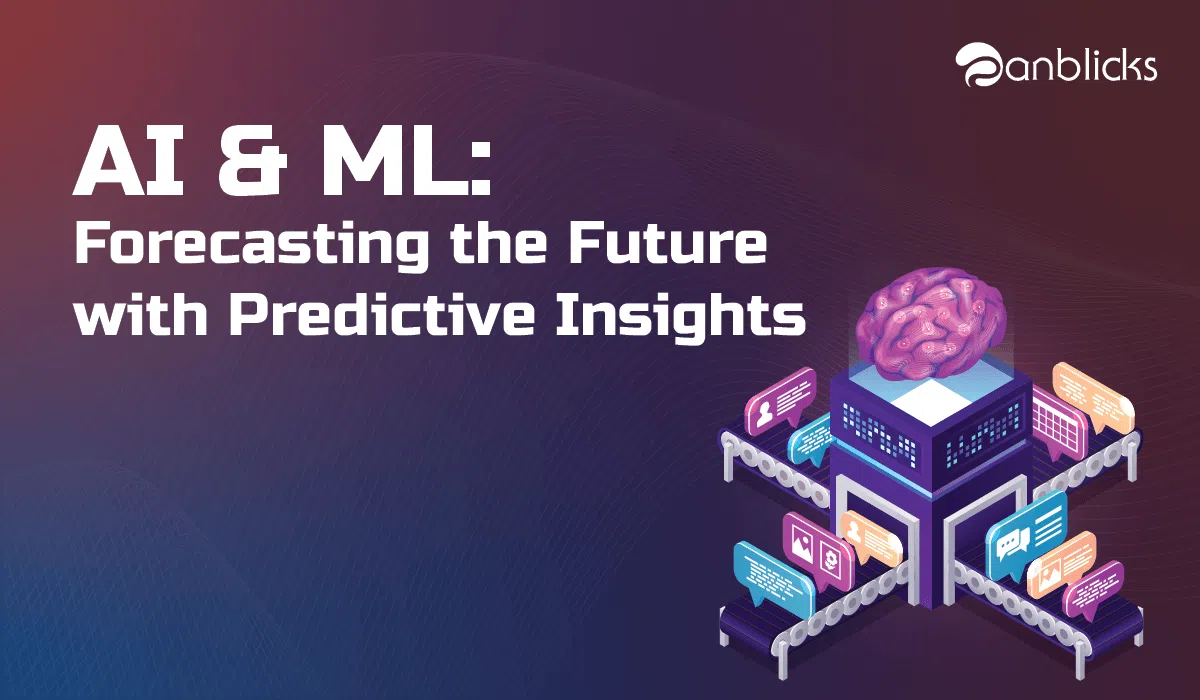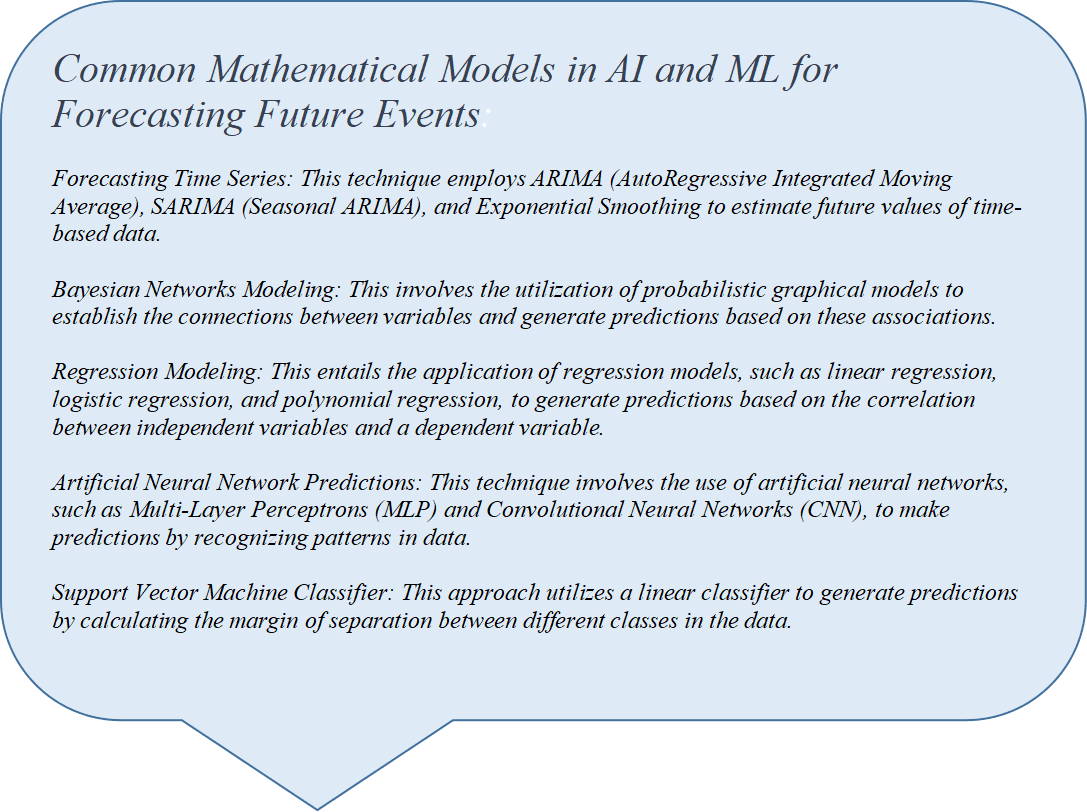
Forecasting Future Events: The Capabilities and Limitations of AI and ML

- Discusses how AI and ML models analyze historical data to forecast future events.
- Highlights the role of predictive algorithms in enhancing decision-making across industries.
- Describes key AI techniques used for creating accurate forecasts, such as time series analysis and neural networks.
Have you ever wondered how fortune tellers, astrologers, or our well-known Baba Vanga used to predict future events? Or have you ever questioned whether AI and ML have the capabilities to predict future events as Baba Vanga did? If AI and ML have the capabilities, then up to what extent can they predict? You will get all the answers to these types of questions.
Can ML and AI be Applied to Predicting What is yet to Come?
Predicting the future is a challenging task, but one that is increasingly being attempted using machine learning and artificial intelligence. These technologies have the potential to revolutionize the way we make predictions in various fields such as finance, healthcare, and natural disasters.
They have the ability to make predictions based on patterns and trends found in data, but the accuracy of those predictions can vary depending on the quality and quantity of the data used, as well as the complexity of the model. It is difficult to predict future events with certainty, as there are many variables that can affect the outcome.
Additionally, predictions about future events, such as natural disasters or world leaders, can also be influenced by human behavior and decision making, which is difficult to model and is currently beyond the capabilities of ML and AI, they are not yet advanced enough to predict future events with a high degree of accuracy.
The Current State of Predictions using ML and AI
Nowadays predictions using ML and AI are seen in various fields. Some examples are, in finance, algorithms have been used to predict stock market prices with a high degree of accuracy. In healthcare, machine learning algorithms have been used to predict the risk of a patient developing a certain disease. In natural disasters, algorithms are used to predict the likelihood of a flood or a hurricane. However, these predictions are not always accurate and there are several challenges that need to be overcome.
However, it’s important to note that while these models and algorithms can provide useful predictions and forecasts, they too are limited by few factors discussed further.
Limitations of Predictions
- Lack of data: In order to make accurate predictions, ML and AI models need large amounts of data to learn from. For certain types of events, there may not be enough data available to train a model.
- The complexity of the task: Some events are inherently more complex than others. For example, predicting the stock market is a highly complex task, as there are many different factors that can influence stock prices.
- Unpredictable events: Some events, such as natural disasters, are difficult to predict because they are caused by unpredictable factors.
- Human behavior is hard to model: Many events depend on human behavior, which is hard to predict. For example, predicting the outcome of an election can be hard because it depends on how people will vote, which can be influenced by many factors such as emotions, beliefs, and context.
- Limited understanding of the world: There are many things we don’t understand about the world, and models can only predict what they were trained on.
- Bias in data: If the data used to train a model is biased in some way, the predictions it makes will also be biased.
Are the limitations strong enough to make predicting future events an impossibility?
It’s difficult to say whether it is impossible to predict future events or not. Predictions are based on incomplete information, and the complexity and uncertainty of the future make it challenging to make accurate predictions.
However, with the advancements in technology and the increasing availability of data, it is becoming possible to predict future events.
Ways to Improve Predictions
Predicting future events is a complex task that requires understanding the underlying factors that influence the event and the ability to model the interactions between those factors. There is no one-size-fits-all approach to predicting future events, but some methods that can be used include:
- Data-driven approaches: This method involves analyzing historical data to identify patterns and trends and using those patterns to make predictions about future events. This method is commonly used in areas such as finance, weather forecasting, and sports prediction.
- Expert opinion: Gaining insights from experts in the field, who have a deep understanding of the factors that influence the event, can be used to make predictions. These experts may use their own experience and knowledge, as well as data-driven approaches, to make predictions. It is important to use a combination of techniques such as ML, AI, and expert knowledge.
- Simulation: Building computer models that simulate the interactions between the factors that influence the event can be used to make predictions. This method is commonly used in areas such as weather forecasting, engineering, and economics.
- Scenario planning: This method involves creating a set of plausible future scenarios and then using them to inform decision making. This approach can be used to predict future events, such as the actions of world leaders, by considering different possible actions and the likely outcomes.
- Continuously monitor and update predictions: The future is constantly changing, and it is important to continually monitor predictions and update them as new information becomes available.
- Be aware of the limitations and uncertainty of predictions: Predictions will never be 100% accurate, and it is important to approach them with a degree of skepticism and to consider them alongside other sources of information.
Furthermore, it’s important to note that even if predictions are accurate, they may not be actionable. For example, if a prediction says that a natural disaster is going to happen, but there is no action that can be taken to prevent it, then the prediction is not useful. Therefore, it’s important to consider the actionability of the predictions when making them.
Conclusion
Predictions are an important tool for decision-making but are subject to limitations. Machine learning and artificial intelligence have the potential to revolutionize the way we make predictions, but it is important to understand the limitations of these predictions.
By collecting more data, developing more advanced models, gathering insights from experts, and incorporating multiple scenarios, predictions can be improved. However, it is important to use these predictions with caution and not to rely on them too heavily.
Source: KDNuggets

I am currently employed as an Associate Data Engineer at Anblicks, where I have gained experience in both Data Engineering and Data Science. My expertise lies in effectively utilizing the RapidMiner tool. I am curious to explore areas that pose intriguing questions without readily available answers. Furthermore, my personal time is dedicated to pursuing my passion for astronomy, where I actively engage as an Amateur Astronomer.











